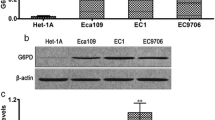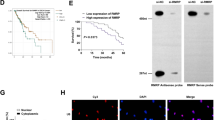Abstract
Esophageal squamous cell carcinoma (ESCC) is one of the most common lethal tumors in the world, and the development of new therapeutic targets is needed. Recent studies have shown that aerobic glycolysis, also known as the Warburg effect, mediated the anti-apoptotic effects in cancer cells. Lactate dehydrogenase A (LDHA) which executed the final step of aerobic lactate production has been reported to be involved in the tumor progression. However, the function of LDHA in ESCC has not been investigated. In this study, it was found that LDHA was up-regulated in ESCC clinical samples. Knockdown of the expression of LDHA inhibited cell growth and cell migration in vitro as well as tumorigenesis in vivo. With regard to the molecular mechanism, silencing the expression of LDHA was related to decreased AKT activation and cyclin D1 expression and increased cleavage of PARP and caspase 8. Taken together, our findings suggest that LDHA plays an important role in the progression of ESCC by modulating cell growth, and LDHA might be a potential therapeutic target in ESCC.





Similar content being viewed by others
Reference
Deng YZ, Chen PP, Wang Y, Yin D, Koeffler HP, Li B, et al. Connective tissue growth factor is overexpressed in esophageal squamous cell carcinoma and promotes tumorigenicity through beta-catenin-T-cell factor/Lef signaling. J Biol Chem. 2007;282(50):36571–81.
Zhou ZQ, Cao WH, Xie JJ, et al. Expression and prognostic significance of THBS1, Cyr61 and CTGF in esophageal squamous cell carcinoma. BMC Cancer. 2009;9:291.
Warburg O. On the origin of cancer cells. Science. 1956;123:309–14.
Lewis BC, Shim H, Li Q, et al. Identification of putative c-Myc-responsive genes: characterization of rcl, a novel growth-related gene. Mol Cell Biol. 1997;17:967–78.
Shim H, Dolde C, Lewis BC, et al. C-Myc transactivation of LDH-A: implications for tumor metabolism and growth. Proc Natl Acad Sci USA. 1997;94:6658–63.
Cai Z, Zhao JS, Li JJ, et al. A combined proteomics and metabolomics profiling of gastric cardia cancer reveals characteristic dysregulations in glucose metabolism. Mol Cell Proteomics. 2010;9(12):2617–28.
Huang L, Zheng M, Zhou QM, et al. Identification of a gene-expression signature for predicting lymph node metastasis in patients with early stage cervical carcinoma. Cancer. 2011;117(15):3363–73.
Gatenby RA, Gillies RJ. Why do cancers have high aerobic glycolysis? Nat Rev Cancer. 2004;4(11):891–9.
Gillies RJ, Robey I, Gatenby RA. Causes and consequences of increased glucose metabolism of cancers. J Nucl Med. 2008;49:24S–42.
Martínez-Zaguilán R, Seftor EA, Seftor RE, et al. Acidic pH enhances the invasive behavior of human melanoma cells. Clin Exp Metastasis. 1996;14:176–86.
Schlappack OK, Zimmermann A, Hill PR. Glucose starvation and acidosis: effect on experimental metastatic potential, DNA content and MTX resistance of murine tumour cells. Br J Cancer. 1991;64:663–70.
Firth J, Ebert B, Pugh C, et al. Oxygen-regulated control elements in the phosphoglycerate kinase I and lactate dehydrogenase A genes: similarities with the erythropoietin 3′enhancer. Proc Natl Acad Sci USA. 1994;91:6496–500.
Fantin VR, St-Pierre J, Leder P. Attenuation of LDH-A expression uncovers a link between glycolysis, mitochondrial physiology, and tumor maintenance. Cancer Cell. 2006;6:425–34.
Dang CV, Semenza GL. Oncogenic alterations of metabolism. Trends Biochem Sci. 1999;24:68–72.
Maher JC, Krishan A, Lampidis T. Greater cell cycle inhibition and cytotoxicity induced by 2-deoxy-d-glucose in tumor cells treated under hypoxic vs aerobic condition. Cancer Chemother Pharmacol. 2004;53:116–22.
Maschek G, Savaraj N, Priebe W, et al. 2-Deoxy-d-glucose increases the efficacy of Adriamycin and paclitaxel in human osteosarcoma and nonsmall cell lung cancers in vivo. Cancer Res. 2004;64:31–4.
Conflicts of interest
None
Author information
Authors and Affiliations
Corresponding authors
Additional information
Feng Yao and Tiejun Zhao contributed equally to this work.
Rights and permissions
About this article
Cite this article
Yao, F., Zhao, T., Zhong, C. et al. LDHA is necessary for the tumorigenicity of esophageal squamous cell carcinoma. Tumor Biol. 34, 25–31 (2013). https://doi.org/10.1007/s13277-012-0506-0
Received:
Accepted:
Published:
Issue Date:
DOI: https://doi.org/10.1007/s13277-012-0506-0




